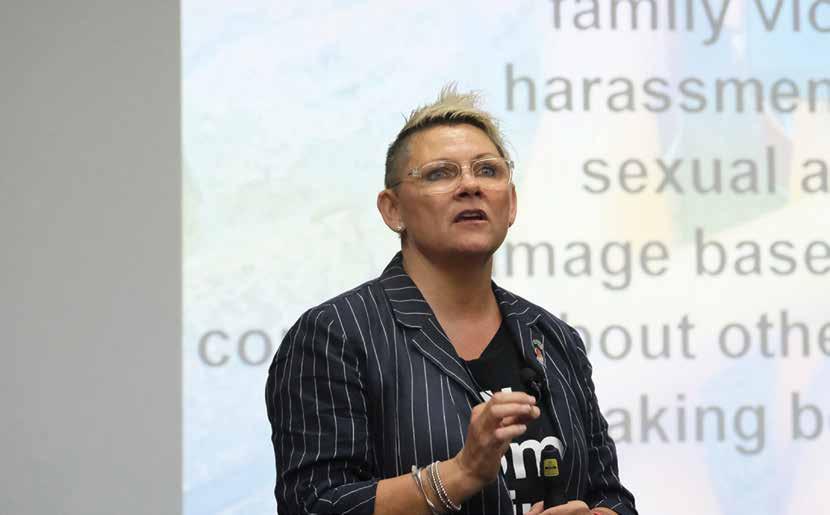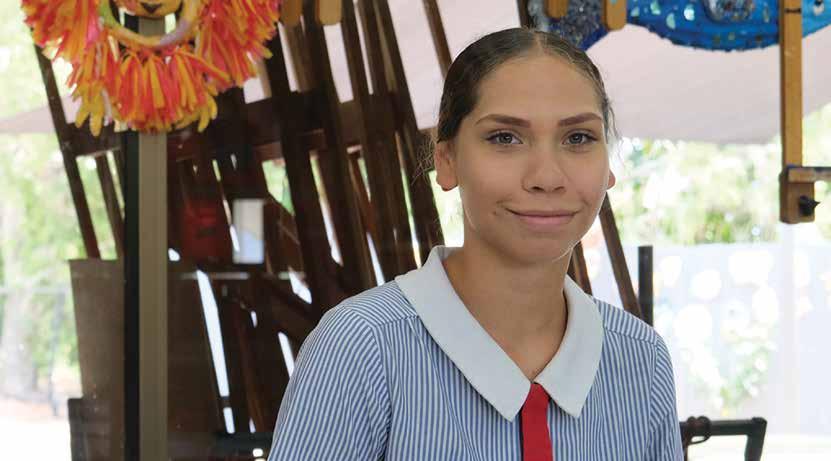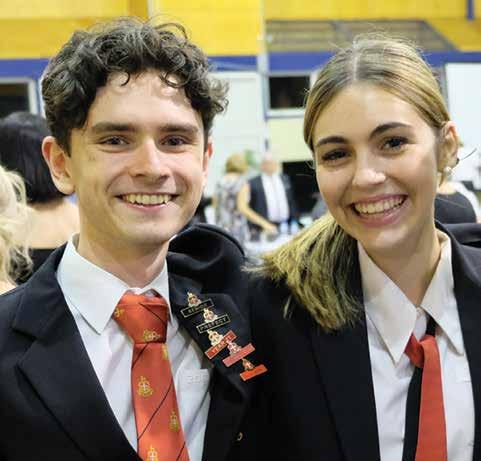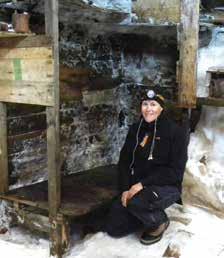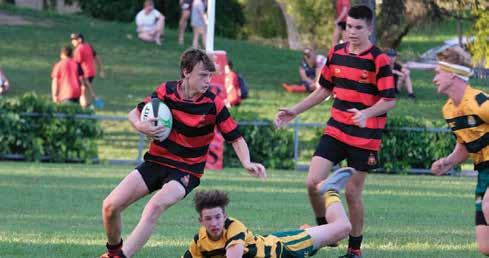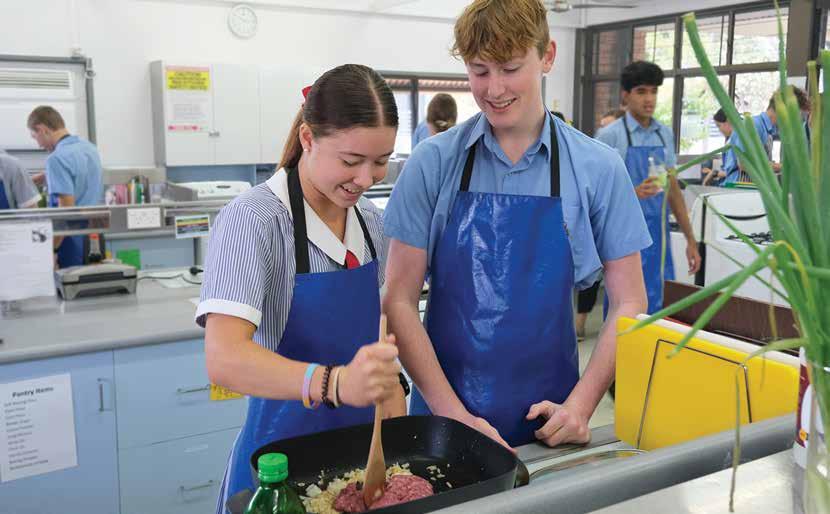
7 minute read
COMMUNITY
Recipe for success: Teaching life skills
Year 12 is often a year of “lasts” – the last exam, the last piece of assessment or the last sporting event. This year, RGS has also challenged many of the Year 12 cohort to try a “first”. The students enjoyed a break from their desks to test their cooking skills when they were introduced to some basic tips to help them when it’s time to leave home or their boarding houses.
Pictured above: Year 12 students Olivia Cook and Alex Niven text their cooking skills on a spaghetti bolognaise meal RGS Year 12 students enjoyed a break from assessment commitments to test their cooking skills in Term 1. Last year RGS Head of Year 12 Mr Nick Blevin and Head of Home Economics Mrs Nyree Malone discussed options to give the Senior students more life skills for when they leave home or head to university. Mrs Malone said they developed a three-week programme that taught cooking in two weeks and simple sewing and mindful mending in the third week. “The recipes we cooked were very cheap (all under $3 per serve) and nutritious and can all be cooked with limited kitchen facilities,’’ Mrs Malone said. RGS Year 12 student Lily Morrison considers herself a “capable cook”, however, still found this programme beneficial. “Not only did it develop everyone’s skills, but it also allowed the students to connect with each other and leave the stress of assessment behind for a little,’’ Lily said. “I think we were all amazed by the affordability and ease of the dishes we were cooking and we have all banked those recipes away for when we possibly move out of home next year.” Lily thanked Mr Blevin, Mrs Malone and all the cooking staff for this wonderful opportunity. Fellow Year 12 student Hugh Ross also enjoyed the cooking lessons. “I rated my cooking as “unorthodox” because our focus was on taste rather than recipe structure,’’ said Hugh, who enjoyed testing the cooking waters. “If you can make it taste better than the recipe just do what it takes,’’ Hugh said. Hugh also enjoyed the “free food”.
In good hands: The heart of education

In Term 2 The Rockhampton Grammar School returns with a new Acting Head of Primary, Mr Bruce Saxby. Mr Saxby steps in for the retired Mr Geoff Hadwen, a long admired staff member at The Rockhampton Grammar School having first started at the School in 2003. Mr Saxby and Mr Hadwen caught up for a chat before the changing of the guard.
Mr Bruce Saxby
Mr Geoff Hadwen
Mr Saxby: Students are the core of everything we do at the school, one thing I’ve noticed is you have a great capacity to know the names of students. Any tips you can give me as to how you can remember so many names?
Mr Hadwen: Try not to get tied to the office desk is the most important thing. If you can manage to get in the classrooms as much as possible you’ll see the kids a lot more. I try each week to visit every classroom even for 10 – 15 minutes to remember names. Every time I see a child I want to say their name. I’m teaching myself their names. I will say, I’m terrible with parents names.
Mr Saxby: What are the strengths of the staff in RGS Primary?
Mr Hadwen: I’ve been given the opportunity to hand pick the Primary staff and I’ve been able to get a great range of staff. The important thing about staff is they are not all the same. Everyone has to have different strengths. It could be on the sporting field, music, chess or cultural things. They firstly have to have a genuine love for kids. They have great skills across a range of things, age is important and a blend of male and female staff is vital. It’s a real juggling act and getting them to work as a team. It’s important the teachers are individuals. My role is to facilitate and assist them in what they want to do. Sustainability in one classroom in Year 4 can be completely different to another classroom, but the concept of sustainability is still there. It’s fascinating to see how kids learn in one classroom compared to another classroom because that’s how the teacher wants to deliver the lesson based on their strengths and allowing them the freedom to do that is one of the biggest things we have in Primary.

RGS Year 6 Student Leaders join Mr Hadwen for one last Primary Formal Assembly
HAVING HOPE IN EVERY STUDENT
When Mr Saxby asked Mr Hadwen about the greatest satisfaction he had with engagement in his career, Mr Hadwen recalled his second year of teaching at Miles State School and a class that will forever stay in his memory and his heart:
“The class I was given was considered horrible. They were a very sporty bunch, and I managed to win them over quickly by agreeing that if they got their jobs done we could do something active outside. They gave me a dog as an end of year present when I was transferred to a one-teacher school. I think I learnt a lot in my second year of teaching.
“If you treat kids well and look after them, you like the kids and make them feel they’re not the worst class in the school and you like what they do, they’ll give it back to you in spades.
“They were the class no one wanted and they were probably my favourite class I ever taught.
All kids are good, you just have to find it in them sometimes. They’ll all make mistakes and it’s ok to make a mistake, but not twice. Not the same mistake twice.”
Mr Saxby: There’s a lot of history at this school. Traditions in Primary, what’s important for me to maintain?
Mr Hadwen: One of the traditions I built around this School, that I’m very proud of, is their uniform. Some people call it old school. Tuck their shirts in, socks are pulled up and they look neat and tidy. It’s actually generally very well respected by the students in the Primary School. It shows pride in their uniform. I know they smile at me on their first day of Year 7 as they walk past me with their PE shirt out because they’ve got older and I’m fine with that. Also, when I first got here I couldn’t understand why Primary had sports houses named after Board Chairmen (Macfarlane, Hay, Jones and Callaghan) and the Secondary School houses were named after headmasters. Pretty much straight away I said we need houses that go right the way through the school, and now we do. My favourite room in the whole school without a doubt is the Memorial Assembly Hall. The history from the Headmasters, the people involved in World War I, the School Captain and Dux from 1881. It’s a great place. This is where the School started. When students leave they become a part of this long history. What past students have achieved in the wider community adds a lot to the character to the school and it’s important to involve and teach the kids about this history.
Mr Saxby: There have been significant facilities added to the Primary School. If you had one more wish for facility development what would it be?
Mr Hadwen: Three years ago I would have said a computer lab, but now so many of the students have tablets in the classroom I don’t see the need for a computer lab. I might sound a bit old school here, but I’m still a very strong believer in a library, in particular in the younger years in Primary. The internet covers many resources now, but for Preps to Year 6 students reading a book is still really important. Having kids reading is still a major influence on their education. A tablet and those things don’t cut it. I don’t think it’s suitable. Picking up a book, sharing a book and reading a book is vital. I would love to see our own library in Primary. Just to borrow books. I don’t think in the next 20 years doing away with books will be an option for kids.
Mr Saxby: What’s the one tip you can give me about my transition into Primary?
Mr Hadwen: Trust the teachers. They are very good at their job. They have the best interest of the kids at heart at all times. There’s going to be some days when things don’t go well for an individual. Supporting them and knowing that you have their back makes life very easy. If you have a happy staff you have a happy school. That flows from the teachers being happy with their kids, their parents, you and their colleage next door. If that happens, the day’s going to be pretty good.

